Bletchley Park kicks so much ass Posted: 21 Jul 2008 05:14 AM CDT 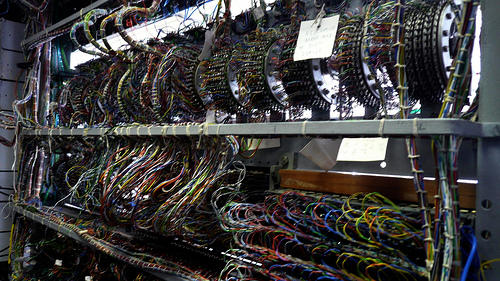 Yesterday, I got one of the best and most memorable birthday presents of my life -- a trip to the legendary Bletchley Park, site of the British WWII codebreaking effort, where Turing and co invented modern computer science and cryptography. The site is just as I'd imagined it -- a rotting, lovely old mansion surrounded by modest, slope-shouldered sheds with a variety of exhibits staffed by knowledgeable, friendly geeks who clearly find it all every bit as exciting as I do.
|
Posted: 21 Jul 2008 04:46 AM CDT I've always loved amateur radio enthusiasts, and many's the time I wished I had a Ham license and a set of my own. But as cool as Ham is as a hobby, it is infinitely cooler for the Hams of Milton Keynes, UK, who are within spitting distance of the legendary Bletchley Park, the site of the famous WWII codebreaking effort that decoded the Nazi messages captured by intrepid Hams from across the UK using giant, beautiful computers. The Milton Keynes Amateur Radio Society actually meets at Bletchley Park on Mondays, and volunteers from the society staff a booth in the museum, surrounded by postcards and certificates from other Hams around the world. Link |
Pocket Enigma Machine in a CD jewel case Posted: 21 Jul 2008 04:33 AM CDT Bletchley Park, the "home of the codebreakers" -- where Alan Turing and co cracked the Nazi Enigma machine -- sells "Pocket Enigma Machines" made from a clever cardboard disc inserted into a CD jewel case. It comes with a very good booklet explaining the basics of ciphering and deciphering with Enigma, and with a bunch of fun Enigma-related activities. Proceeds go to the nonprofit that runs the excellent Bletchley Park museum. Link |
Tor.com: a blog, a social network, a zine -- totally clueful big publishing website Posted: 21 Jul 2008 12:37 AM CDT  Hurrah! Tor, my US novel publisher, has launched Tor.com, its major, fantastically awesome website, which is part sf zine, part group-blog, part social network. They're publishing great original fiction -- they've got stories by John Scalzi and Charlie Stross up now, and I've got one coming soon, called THE THINGS THAT MAKE ME WEAK AND STRANGE GET ENGINEERED AWAY -- with original illustration by the talented Tor art team. They're running fascinating blog-posts on diverse subjects from a team of bloggers that includes in-house people from across the business and outside "friends of Tor" including novelists, fans, critics, and sundry others. And there's a social networking system that ties it all together. Oh, and for a short time, they're also hosting all the free ebooks they gave away to entice you to sign up for the launch-announcement. Run, don't walk. Link |
Spamwar's worst mistakes being recapitulated by the copyright wars Posted: 21 Jul 2008 12:30 AM CDT My latest Guardian column, "Copyright enforcers should learn lessons from the war on spam," looks at the fallout from the failed tactics of the spamwar and asks how the entertainment industry plans on doing any better trying the same tactics on an even grander and more savage scale: Content-based filtersLink |
Night of the Gun, a new book by David Carr. Posted: 20 Jul 2008 11:51 AM CDT 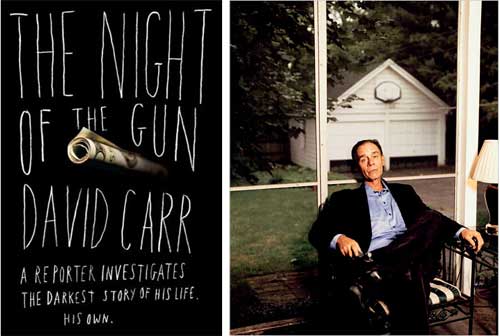 Every time I try to explain David Carr to a friend, I say something like "That dude is the real deal." Carr is a media/culture columnist for The New York Times, and he's a better writer and a tougher human than I'll ever be. I've corresponded with him a few times over the years about stories he was working on, or whatever, and I met him in Los Angeles when he came to visit Boing Boing tv for a piece he wrote about our launch. So, I've been eager to see his new book come out, ever since I learned he was writing it -- and I'm excited to say that it's out in a few weeks, and there's a preview in the NYT today. The Night of the Gun recounts David Carr's life as a crack addict, pieced back together through interviews with people who were part of his life at the time. It's an amazing book. You have to read this thing. I hope I'm not revealing any spoilers here, but when I asked Carr about the project last in LA year, he told me about reconnecting with one of those old friends, and trying to recover the facts about one night when he was out of his mind high on speed, something about jumping through a window and police showing up and a huge fight with the friend, the sort of high velocity drug-o-drama you'd see on COPS. In the hazy, semifictional way an addict can try to remember things that happened when he was high -- he's always remembered his friend pointing a gun at him, at one point during the climax of that crisis. But when Carr went back years later to interview that friend for this project, the friend told him something like, "No, you were pointing the gun at me." I believe that's where the title comes from. Here's a snip from the excerpt in today's NYT: Where does a junkie's time go? Mostly in 15-minute increments, like a bug-eyed Tarzan, swinging from hit to hit. For months on end in 1988, I sat inside a house in north Minneapolis, doing coke and listening to Tracy Chapman's "Fast Car" and finding my own pathetic resonance in the lyrics. "Any place is better," she sang. "Starting from zero, got nothing to lose."Continue reading excerpt; photos and multimedia stuff here too. Me and My Girls [New York Times] Buy the book: The Night of the Gun: A reporter investigates the darkest story of his life. His own. [amazon] Website, with first-person video. Flash required. Night of the Gun [Simon and Schuster] |
2008年7月21日星期一
The Latest from Boing Boing
标签 :
Boing Boing,
Digest
订阅:
博文评论 (Atom)
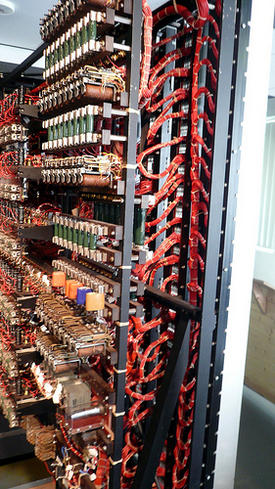 The exhibits are a nice mix of technical and historical, ranging from a truly impressive collection of memorabilia related to Winston Churchill (who visited Bletchley and congratulated the women and men there on their excellent work), including his school report-card that makes him out to be a villainous, disruptive and scattered child; to a series of exhibits of vintage wartime toys. There's a museum of ancient cinematographic equipment complete with a beautiful little theatre that shows reels of vintage newsreels and propaganda films. And of course, there are the computers and related devices.
The exhibits are a nice mix of technical and historical, ranging from a truly impressive collection of memorabilia related to Winston Churchill (who visited Bletchley and congratulated the women and men there on their excellent work), including his school report-card that makes him out to be a villainous, disruptive and scattered child; to a series of exhibits of vintage wartime toys. There's a museum of ancient cinematographic equipment complete with a beautiful little theatre that shows reels of vintage newsreels and propaganda films. And of course, there are the computers and related devices. 
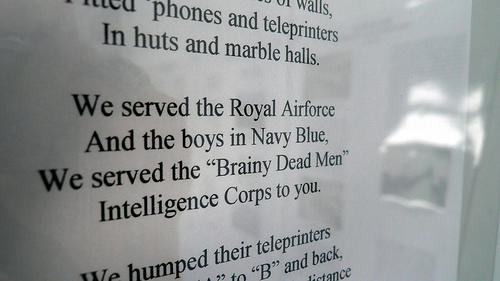

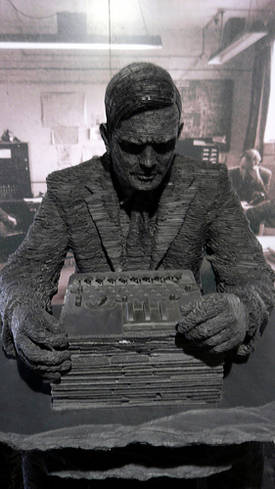 We spent three hours on site and barely scratched the surface. We had hardly any time to look at the war-plane, didn't get to the gigantic model railroad exhibit, didn't see the whole film presentation at the Enigma theatre, and only got the most hurried of walks around the American Gardens -- and we missed the mansion tour altogether. I could have easily spent eight or more hours there, and still wanted for more. Just the tantalizing mini-lecture I got on the Colossus rebuild from one of the electronics engineers who worked on it was enough to pique my interest, and I could have spent an hour looking at the details in Turing's office.
We spent three hours on site and barely scratched the surface. We had hardly any time to look at the war-plane, didn't get to the gigantic model railroad exhibit, didn't see the whole film presentation at the Enigma theatre, and only got the most hurried of walks around the American Gardens -- and we missed the mansion tour altogether. I could have easily spent eight or more hours there, and still wanted for more. Just the tantalizing mini-lecture I got on the Colossus rebuild from one of the electronics engineers who worked on it was enough to pique my interest, and I could have spent an hour looking at the details in Turing's office. 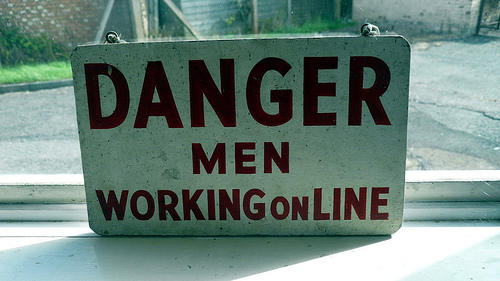
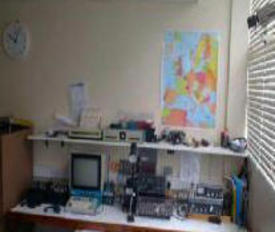 In 1993, Radio Club Members Warren Backhouse, John James, Eric Simpson and David White, who had been meeting every Wednesday at the Bletchley Park Social Club for many years, decided to assist in a recently set-up project to save the Bletchley Park code breaking centre from demolition. Their (unspoken) objective was to secure a toe-hold on the Bletchley Park site, with the intention of obtaining premises which would be suitable for use by the Radio Club.
In 1993, Radio Club Members Warren Backhouse, John James, Eric Simpson and David White, who had been meeting every Wednesday at the Bletchley Park Social Club for many years, decided to assist in a recently set-up project to save the Bletchley Park code breaking centre from demolition. Their (unspoken) objective was to secure a toe-hold on the Bletchley Park site, with the intention of obtaining premises which would be suitable for use by the Radio Club. 

0 条评论:
发表评论